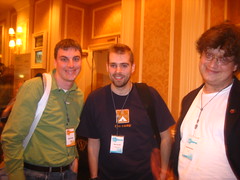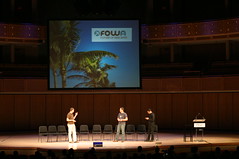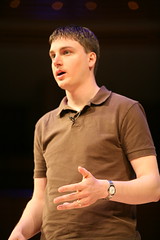Social Networks: Where are they taking us?
MIX 08 (panel)
Las Vegas, NV (Venetian)
March 6, 2008
Download audio (WMV 43.9 MB, MP4 38.6 MB)
 Joshua Allen from Microsoft contacted me and asked if I’d like to be on a panel at MIX 08, Microsoft’s big web-focused conference, about the future of social networks. I’d never been to a Microsoft conference before (most of the events I go to are full of fellow valley startup people), so I was curious for the “anthropological value”, and when he told me the panel would be moderated by Guy Kawasaki and feature a cast of heavy hitters (Dave Morin from Facebook, Garret Camp from StumbleUpon, Marc Canter, and John Richards from Microsoft Live Platform), I knew I couldn’t possibly pass up this chance. Good thing too, because it was a remarkable event and certainly quite memorable.
Joshua Allen from Microsoft contacted me and asked if I’d like to be on a panel at MIX 08, Microsoft’s big web-focused conference, about the future of social networks. I’d never been to a Microsoft conference before (most of the events I go to are full of fellow valley startup people), so I was curious for the “anthropological value”, and when he told me the panel would be moderated by Guy Kawasaki and feature a cast of heavy hitters (Dave Morin from Facebook, Garret Camp from StumbleUpon, Marc Canter, and John Richards from Microsoft Live Platform), I knew I couldn’t possibly pass up this chance. Good thing too, because it was a remarkable event and certainly quite memorable.
The panel itself went very well–it was right after the amazing, boisterous keynote conversation between Steve Ballmer and Guy Kawasaki, so the fact that Guy was also running our panel brought in an extra large crowd. The discussion was heated and productive: how quickly will/should social networks open up, when will OpenID be ready for mass adoption, what about privacy issues, and so on. Guy was his usual awesome self: light-hearted but pointed, and always cutting to the chase. There were lots of questions from the audience, and they came up to talk for quite a while after the panel ended, so they were clearly engaged and interested, which is the best thing I could hope for.
 Another thrill for me was getting to spend a lot of time with the IE team. The first IE 8 beta had just been released, and it was clear the team was fired up to really make a leap forward in standards support, performance, and features. Along with dojo creator Alex Russell, PPK of QuirksMode fame, JavaScript guru Doug Crockford, and a few others, the IE team invited us to a VIP party with them that started in TAO (a ridiculously large night club in the Venetian, complete with a roof-top beach) and ended up in the “Kingpin Suite” at the Palms, complete with in-room bowling alleys. Man, these guys know how to party! And they were genuinely interested in hearing our feedback about how to make IE better, how to provide better tools, and so on. As a long-time web developer, I normally assume I have no visibility into or control over the actual browser, how it works, or where it’s going, and my job is just to work around its issues as I find them. So it’s an amazing feeling to actually know the people writing the code for the next version of IE, and to know that my feedback might actually have a real impact. That coupled with the passion of the new IE team members gives me great optimism that the web platform will indeed get a lot better soon.
Another thrill for me was getting to spend a lot of time with the IE team. The first IE 8 beta had just been released, and it was clear the team was fired up to really make a leap forward in standards support, performance, and features. Along with dojo creator Alex Russell, PPK of QuirksMode fame, JavaScript guru Doug Crockford, and a few others, the IE team invited us to a VIP party with them that started in TAO (a ridiculously large night club in the Venetian, complete with a roof-top beach) and ended up in the “Kingpin Suite” at the Palms, complete with in-room bowling alleys. Man, these guys know how to party! And they were genuinely interested in hearing our feedback about how to make IE better, how to provide better tools, and so on. As a long-time web developer, I normally assume I have no visibility into or control over the actual browser, how it works, or where it’s going, and my job is just to work around its issues as I find them. So it’s an amazing feeling to actually know the people writing the code for the next version of IE, and to know that my feedback might actually have a real impact. That coupled with the passion of the new IE team members gives me great optimism that the web platform will indeed get a lot better soon.
 It was an odd feeling going to such a large conference where I knew so few people, and where there were so few startups represented (most of the developers seemed to be from large companies, IT organizations, and so on). But I learned a ton, had a great time, and even managed to shoot some photos in the process. The only downside was that upon leaving the hotel to go to the airport, the hotel realized they couldn’t find my suitcase which I’d checked earlier that day. Turns out some bellhop put it in the trunk of another car by mistake, and it ended up with a family in LA. The hotel said they’d pay to have it shipped up to me, but I still don’t have it. Since I was leaving the next day for SXSW, I had to quickly scrounge together a fresh set of toiletries, clothes, and so on. Luckily nothing too irreplaceable was in my suitcase, and hopefully it will show up on my doorstep any day now, but yeesh, what a way to end a trip!
It was an odd feeling going to such a large conference where I knew so few people, and where there were so few startups represented (most of the developers seemed to be from large companies, IT organizations, and so on). But I learned a ton, had a great time, and even managed to shoot some photos in the process. The only downside was that upon leaving the hotel to go to the airport, the hotel realized they couldn’t find my suitcase which I’d checked earlier that day. Turns out some bellhop put it in the trunk of another car by mistake, and it ended up with a family in LA. The hotel said they’d pay to have it shipped up to me, but I still don’t have it. Since I was leaving the next day for SXSW, I had to quickly scrounge together a fresh set of toiletries, clothes, and so on. Luckily nothing too irreplaceable was in my suitcase, and hopefully it will show up on my doorstep any day now, but yeesh, what a way to end a trip!









